Related Research Articles
Máximo Antonio del Rosario, professionally known as Toño Rosario, is a Dominican Grammy Award-nominated musician, best known for his role of bandleader of Merengue music act Los Hermanos Rosario. In 1990, he started his successful solo career receiving gold and platinum certifications.
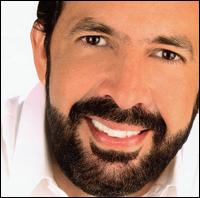
Para Ti is the ninth studio album by singer-songwriter Juan Luis Guerra and his band 4.40. It was released on August 31, 2004, by Vene Music and distributed by Universal Latin Music. It was his first studio album in six years since Ni es lo mismo ni es igual (1998) and is his first Christian-gospel inspired album. The lyrics are inspired by his conversion to Christianity and his experience of being a born again Christian. The album explores music genres from gospel and ballads to the salsa and merengue. The album was supported by the release of three official singles: "Para Ti", "Las Avispas" and "Dinteles".

Ni Es lo Mismo, Ni Es Igual is the eighth studio album recorded by Dominican singer-songwriter Juan Luis Guerra and his band 4.40. It was released by Karen Records on 15 December 1998 and distributed by PolyGram Latino. It was Guerra's comeback album after four years of silence, out of the public eye and since his conversion to Christianity. It was his first studio album since Fogarate (1994). The album production and songwriting were done by Guerra. The album was supported by the release of four official singles: "Mi PC", "Palomita Blanca", "El Niagara en Bicicleta" and "La Hormiguita". Two singles were released as promotional singles: "Vale La Pena" and "Quisiera".
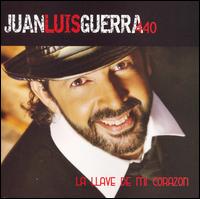
La Llave de Mi Corazón is the 10th studio album recorded by Dominican singer-songwriter Juan Luis Guerra, It was released by EMI Televisa Music on March 20, 2007. It was Guerra's first album to contain songs in English since his 1994 recording of Fogarate. The album contains fusions of mambo and tropical rhythms that Guerra himself defined as "Mambo merengue". Its production and musical structure of album is based on merengue, bachata and salsa and encompasses elements of Blues, Son, Jazz, Mambo and Bossa Nova. The album was written, arranged and produced by Juan Luis Guerra and according to the artist is his most romantic album. It is composed of four merengues, two bachatas, three romantic songs and two salsas.

Bachata Rosa is the fifth studio album by Dominican singer-songwriter Juan Luis Guerra and his group 4.40. It was released on 11 December 1990, by Karen Records. It brought bachata music into the mainstream in the Dominican Republic and gave the genre an international audience. A Portuguese version of the record was released in 1992 under the title Romance Rosa; it was certified gold in Brazil. The album received a Grammy Award for Best Tropical Latin Album and two Lo Nuestro Awards for Tropical Album of the Year and Tropical Group of the Year.

Ilegales is a Grammy-nominated Dominican merenhouse group, which is one of the main exponents that helped to introduce and establish the merenhouse to the mainstrean and get an international audience. The band is well known by hits such as "La Morena", "Taki Taki", "Tu Recuerdo", "La Otra" and "Chucucha". They were one of the first merenhouse acts to perform at Viña del Mar International Song Festival in 1998 and 2003.

Ojalá Que Llueva Café is the fourth studio album by Dominican singer-songwriter Juan Luis Guerra released in 1989 by Karen Records. It is considered one of his most emblematic and important albums. The album set the musical path for his later albums, re-formulating Dominican merengue and bachata music through the contemporary elements of pop, rock, salsa, or jazz. Incorporating socially conscious lyrics with danceable merengues and romantic-poetic bachatas, the album is considered one of the most important albums of his discography.

Fogaraté! is the seventh album of the famous Dominican songwriter and musician Juan Luis Guerra. It was released on July 19, 1994. The album mixed a variety of music genres including rural and folkloric roots of merengue called "Perico Ripao" with elements of African soukus music and Tropical Music such as Reggae with the collaboration of African guitarist Diblo Dibala and Dominican accordionist Francisco Ulloa, along with Son, Bachata and Salsa. Also, the album features a particular, bachata-styled adaptation of the Lacrimosa movement from Mozart's Requiem Mass in D Minor and Guerra's first song fully in English "July 19". Exploring lyrics and themes about magical realism of Latin American literature and commenting on the politics of the Caribbean, for many fans and critics, Fogaraté! is one of his most musically complex album.
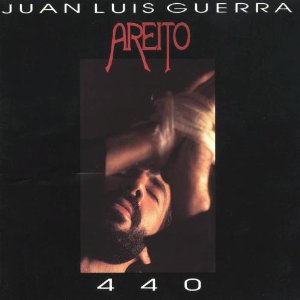
Areíto is the sixth album by Juan Luis Guerra with his band 440, released on 8 December 1992, by Karem Records. The album, meant to be a tribute to the indigenous tribes of the Dominican Republic, is named after a dance that the aboriginal inhabitants of the Greater Antilles (Taínos) accompanied with songs during their festivals and religious rites. The album contains twelve tracks including "Cuando te Beso", interpret by Santo Domingo Philharmonic Orchestra. Congolese musician Diblo Dibala played guitar on the song "El Costo de la Vida", which was a Spanish cover of his own soukous song "Kimia Eve", while the last track on the album, "Naboria daca, mayanimacaná", is sung in Arawak, the language of the Taíno people. Areíto was originally set to be released in early April 1992, but was first delayed to the end of October 1992 and was finally released on 8 December 1992.
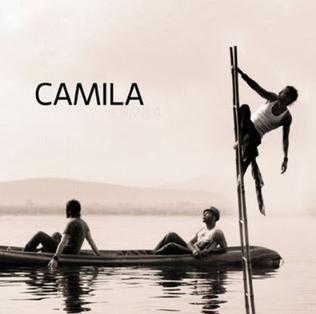
Dejarte de Amar is the second studio album recorded by Mexican pop rock band Camila, It was released by Sony Music Latin on February 9, 2010 Produced by band leader Mario Domm and mostly written by Domm and Mónica Velez, the album became a success in the United States and Mexico. The album was certified Disco Platino in the United States by the RIAA and 4× Platinum in Mexico by AMPROFON. It was recorded in Mexico at Mamita Studio with theme about love, loneliness and lies. The album spawned three singles: "Mientes", "Aléjate de Mi", and "Bésame", all of which reached number-one on the Billboard Latin Pop Airplay chart. The album received generally positive reviews for its arrangements and compositions.

A Son de Guerra, sometimes referred to as Asondeguerra, is the 11th studio album recorded by Dominican singer-songwriter Juan Luis Guerra, It was released by Capitol Latin on June 8, 2010. The album contains 11 tracks, and its musical structure and production are based on Merengue, Bachata, Son, Salsa, experimenting and incorporating elements of jazz, blues, funk, cumbia, rock, reggae, rap, and mambo. Lyrical themes on the album include protest against political corruption, immigration, love and romance. Featured appearances include Juanes and Chris Botti. For many fans and critics alike, it's his album with the most social content and strong social criticism since his 1992's Areito.

Grandes Éxitos de Juan Luis Guerra y 440 or simply Grandes Éxitos is a compilation album of Dominican singer-songwriter Juan Luis Guerra, and his band 440 released in July 1995 by Karem Records. It contained Guerra's fifteen biggest hits from 1988 to 1994 on the original version and from the albums Mudanza y Acarreo(1985) to Fogarate! (1994) on the international versions. The compilation receive positive reviews by the critics.

Colección Romántica is a compilation album by Dominican songwriter and musician Juan Luis Guerra and 4.40. It was released in November 21, 2000 and February 6, 2001 in the United States by Karen Records. It is a dual album compilation including 20 of the group's classic songs remastered and re-recorded as ballads. The album also contained unaltered original versions of their softer songs, like acoustic ballads or bachatas. It would become Guerra's last album released under the Dominican independent music label Karen Records, as his later albums would be released under Vene Music and subsequently under EMI music and Capitol Latin.

Juanes: MTV Unplugged is the second live album of Colombian singer Juanes. It was recorded before a live audience at the New World Symphony Center in Miami Beach, Florida, on February 1, 2012, and was released by Universal Music Latino on May 29, 2012. The album includes featured performances by the Spanish composer Joaquín Sabina and the Brazilian singer Paula Fernandes. The album features rearranged takes on Juanes' hit songs like "Me Enamora", "La Camisa Negra" and "A Dios le Pido". The first single of the live album was released on March 5, 2012, called La Señal, which became a hit in Latin America. The second single was "Me Enamora", with new instrumental arrangements, and was released two days after of the album's release. The album featured three new songs, one of which was a collaboration with Joaquín Sabina. The album debuted at number one on the Billboard Top Latin Albums Chart and won the 2012 Latin Grammy for Album of the Year. This was the third time he won Album of the Year at the Latin Grammys.

Todo Tiene Su Hora is the 13th studio album by Dominican singer-songwriter Juan Luis Guerra and his band 4.40. It was released on November 11, 2014, by Capitol Latin and was produced by Juan Luis Guerra & Janina Rosado. Like his previous albums, the album is composed by variety of tropical music genres such as bachata, merengue, salsa and son but with different instrumentation normally used in classical music such as strings and violins. Guerra described the album as "innovative" and explored lyrics raging from love and romance to social conscience and protest against political corruption. The record encompassed elements of funk and jazz with merengue and classical music with bachata.

Golden is the third studio album by American singer Romeo Santos, released on July 21, 2017 by Sony Music Latin. The album production mixed bachata with other genres such as jazz, bolero and reggaeton. The majority of the tracks were written by Santos and co-produced with sound engineer Mate Traxx. It encompasses bachata treated with synthesizer, piano, hyperkinetic percussion and guitars. It contains 18 tracks exploring lyrics ranging from hate, criticism, tabloid rumors to love and sex and features guest appearances from Swizz Beatz, Juan Luis Guerra, Ozuna, Nicky Jam, Daddy Yankee, Julio Iglesias and Jessie Reyez. It also features production from Santos, Allen Ritter, Boi-1da, Frank Dukes, Illangelo, Illmind, Matetraxx, Swizz Beatz, Tainy, and Vinylz, among others.

"Bachata Rosa" is a song by Dominican Republic singer-songwriter Juan Luis Guerra released in 1991 and served as the lead seventh and final from his fifth studio album Bachata Rosa (1990). Along with Estrellitas y Duendes and Como Abeja Al Panal, is one of Guerra's first international hits and helped to contribute to the bachata sophistication and have recognition in Latin America and Europe. The track was a commercial success, toping the airplay charts in Mexico and was the fourth single of the album to peak insade of the top 10 at the US Hot Latin Tracks.
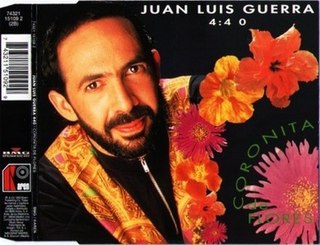
Coronita de Flores is the fifth single of Juan Luis Guerra sixth studio album Areito, released in 1993 by Karem Records. The song was written band produced by Juan Luis Guerra. The track received positive reviews due the musical structure of cha-cha and Bolero and was nominated for Tropical/Salsa Song of the Year at the 1994's Lo Nuestro Awards.
"Mal de Amor" (Lovesickness) is the fourth single from Juan Luis Guerra's sixth studio album Areíto, released in 1993 by Karem Records. The melody is by Nemous Jean Baptiste the Haitian compositor in 1960 the song was written and produced by Guerra. The track encompasses traditional merengue with Cumbia. The song was the fourth consecutive single from the album to reach the top-ten on the Billboard Hot Latin Songs chart in the United States. It also reached the top-ten in Venezuela.
References
- ↑ "Juan Luis Guerra "Entre Mar y Palmeras"". GoDominicanRepublic.com (in European Spanish). Retrieved 2022-04-27.
- ↑ "Juan Luis Guerra y su 4:40 cautivo a todos los mexicanos". h.elsiglodetorreon.com.mx. August 12, 1991. Retrieved 2022-05-03.
- 1 2 "Reference at worldradiohistory.com" (PDF).
- ↑ Billboard. Nielsen Business Media, Inc. 1994-07-09.
- 1 2 3 4 5 6 7 8 "American certifications – Juan Luis Guerra". Recording Industry Association of America.
- 1 2 "CERTIFICADOS – Pro-Música Brasil". pro-musicabr.org.br. Retrieved 2019-04-27.
- 1 2 "Juan Luis Guerra - República Dominicana Live ! - Biografia, carrera, evolución musical, discos y canciones del artista de merengue Juan Luis Guerra". Republica-dominicana-live.com. Archived from the original on December 23, 2010. Retrieved 2020-06-27.
- ↑ "Spanish Certifications for 1996-1999". MediaFire. Retrieved 2022-04-27.
- 1 2 "Ventana de articulo". H.elsiglodetorreon.com.mx. Retrieved 2021-05-25.
- ↑ "Ventana de articulo". h.elsiglodetorreon.com.mx. Retrieved 17 May 2022.
- 1 2 3 Panamá, GESE-La Estrella de. "Juan Luis Guerra 'Un alto a la violencia'". Laestrella.com.pa (in Spanish). Retrieved 2020-11-19.
- ↑ "Juan L. Guerra recibe Discos de Oro de Colombia y Ecuador". Diario Libre (in Spanish). Retrieved 2022-04-27.
- 1 2 "AMPROFON". amprofon.com.mx. Retrieved 2019-04-27.
- ↑ Mendizabal, Amaya (2014-11-21). "Juan Luis Guerra Crowns Top Latin Albums". Billboard. Retrieved 2022-04-27.
- 1 2 "Disco de oro para Juan Luis Guerra". Diariolibre.com (in European Spanish). Retrieved 2019-05-03.
- 1 2 3 "Juan Luis Guerra Album & Song Chart History". Billboard.com. Retrieved December 5, 2009.
- 1 2 "Juan Luis Guerra 440 Chart History". Billboard. Retrieved 2019-04-26.
- 1 2 3 4 5 6 7 8 9 "Juan Luis Guerra 440 Chart History". Billboard. Retrieved 2019-04-06.
- 1 2 "spanishcharts.com - Spanish charts portal". spanishcharts.com. Retrieved 2019-04-26.
- 1 2 "Dutch Charts - dutchcharts.nl". dutchcharts.nl. Retrieved 2019-04-26.
- ↑ "Juan Luis Guerra - Music Charts". acharts.co. Retrieved 2019-04-27.
- ↑ "Reference at worldradiohistory.com" (PDF).
- ↑ "Discos de platino". Pwpamplona.com. Archived from the original on 2022-02-09. Retrieved 2019-05-22.
- ↑ "Reference at worldradiohistory.com" (PDF).
- ↑ "Reference at worldradiohistory.com" (PDF).
- ↑ "Biografía". Juan Luis Guerra (in Mexican Spanish). Retrieved 2022-04-19.
- ↑ "Reference at worldradiohistory.com" (PDF).
- ↑ "Ventana de articulo". h.elsiglodetorreon.com.mx. Retrieved 2021-05-28.
- ↑ "Reference at worldradiohistory.com" (PDF).
- ↑ "Billboard". 9 July 1994.
- ↑ "Goud/Platina". nvpi.nl. Archived from the original on 2018-07-04. Retrieved 2019-04-27.
- ↑ Billboard. Nielsen Business Media, Inc. 1991-10-12.
Juan Luis Guerra.
- ↑ "Reference at worldradiohistory.com" (PDF).
- ↑ "HNDM-Publicación". Hndm.unam.mx (in European Spanish). Retrieved 2022-04-30.
- ↑ "Ventana de articulo". h.elsiglodetorreon.com.mx. Retrieved 2021-05-25.
- ↑ "Book About Spanish Charts (1959-2002!)". UKMIX Forums. Retrieved 2021-04-19.
- ↑ "Ventana de articulo". h.elsiglodetorreon.com.mx. Retrieved 2021-05-25.
- ↑ "Reference at worldradiohistory.com" (PDF).
- ↑ "LISTAS DE AFYVE: 1999 Albumes (1ª parte)". Afyvecharts.blogspot.com. 2007-08-31. Archived from the original on 2013-10-03. Retrieved 2020-12-10.
- ↑ Cubeiro, Juan Carlos (2009-04-05). "El Talento de Juan Luis Guerra". Juancarloscubeiro.com (in Spanish). Archived from the original on 2020-11-15. Retrieved 2020-11-17.
- ↑ "Edición del viernes, 19 marzo 1999, página 45 - Hemeroteca - Lavanguardia.es". Hemeroteca.lavanguardia.com. Retrieved 2022-05-05.
- ↑ "Discos de platino y oro 1999 (*)". Elmundo.es. Retrieved 2019-05-22.
- ↑ "CMTV - Biografía de Juan Luis Guerra". CMTV.com.ar (in Spanish). Retrieved 2020-09-10.
- ↑ Corripio, Grupo de medios (2004-11-17). "Juan Luis Guerra logra un disco de platino". Hoy Digital (in Spanish). Retrieved 2025-01-10.
- ↑ "Juan Luis Guerra sorprende con un disco cristiano". Abc.es.
- ↑ Billboard. Nielsen Business Media, Inc. 2010-04-03.
- ↑ Billboard. Nielsen Business Media, Inc. 2010-04-03.
- ↑ "Weekly charts - Charts - Promusicae - Productores de Música de España". Promusicae.es. Retrieved 2019-04-27.
- ↑ "Juan Luis Guerra recibe Cuádruple Platino en Colombia por "La llave de mi corazón"". RPP (in Spanish). Retrieved 2019-05-22.
- ↑ "Juan Luis Guerra: Bachata en directo". Reporte Indigo (in European Spanish). Retrieved 2020-11-16.
- ↑ "Juan luis guerra gana disco de platino en Venezuela". Yosoyvenezolano.com (in Spanish). 2011-02-24. Retrieved 2019-05-22.
- ↑ "Juan Luis Guerra Disco de Platino en Colombia por 'Colección Cristiana'". Tropicana Bogotá (in Spanish). 2012-11-01. Retrieved 2019-05-22.
- ↑ "El tour "Todo tiene su hora", nos subirá la bilirrubina". Blog Banpro (in Spanish). 2017-10-31. Retrieved 2020-11-16.
- ↑ "Top 100 Albumes – Semana 23: del 31.5.2019 al 6.6.2019" (in Spanish). Productores de Música de España . Retrieved June 12, 2019.
- ↑ "Juan Luis Guerra recibe disco de oro por ventas álbum "Asondeguerra Tour"". Noticias SIN (in Spanish). 2013-07-12. Retrieved 2019-05-22.
- ↑ "Juan Luis Guerra Certificado Disco de Oro en Colombia Con Su Álbum ASONDEGUERRA Tour". Rumberos.net (in European Spanish). Retrieved 2019-05-22.
- ↑ "Juan Luis Guerra obtiene Disco de Oro por sus ventas de "AsonDeGuerraTour" en Colombia y Ecuador". Radiokdecolombia.com. Retrieved 2019-05-22.
- ↑ "Reference at worldradiohistory.com" (PDF).
- 1 2 3 "Juan Luis Guerra 440 Chart History". Billboard. Retrieved 2019-04-29.
- ↑ "Reference at worldradiohistory.com" (PDF).
- ↑ "Reference at worldradiohistory.com" (PDF).
- ↑ "Reference at worldradiohistory.com" (PDF).
- ↑ "spanishcharts.com - Enrique Iglesias feat. Juan Luis Guerra - Cuando me enamoro". spanishcharts.com. Retrieved 2019-04-29.
- ↑ "Maná Chart History". Billboard. Retrieved 2019-04-29.